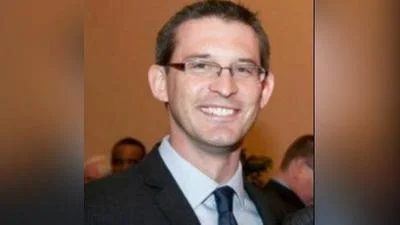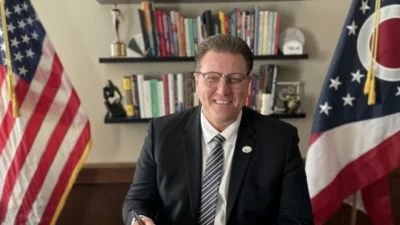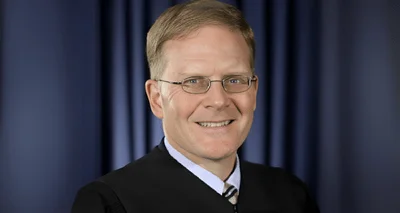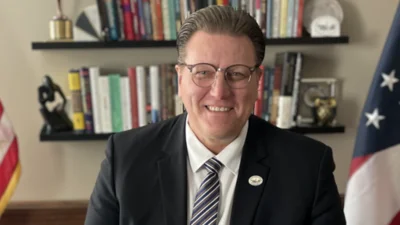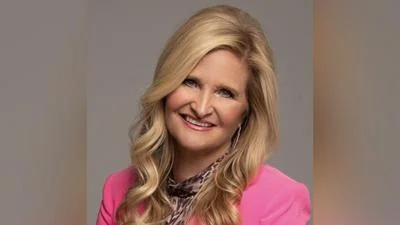On Feb. 20 incumbent Knox County Commissioner Thom Collier was faced with questions over his support of industrial solar projects in Knox County.
Collier, who boasts a lengthy tenure as a Knox County Commissioner spanning 12 years, preceded by an eight-year stint in the Ohio House of Representatives, has been a pivotal figure in paving the way for solar initiatives within the county.
Collier, who now confronts staunch solar adversaries Bob Phillips and Drenda Keesee in a bid to defend his commission seat, met with his opponents for a moderated candidate discussion at the Woodward Opera House.
The trio is poised for a showdown in the upcoming March 19 GOP primary, a contest widely regarded as pivotal for the outcome of the Nov. 5 general election.
Collier defended his stance on greenlighting industrial solar noting a 2022 vote on the issue.
“When we held our public meeting, there were hundreds of people in attendance,” he said. “Many people spoke. No one spoke in favor of wind. On solar it was about a 50/50 split. We decided that we would wait and gather additional information and input. We waited the 90 days. We passed our resolution banning wind and leaving open the door for solar.”
Collier expressed resignation to solar going forward despite homegrown support against industrial solar developments.
“We do have to deal with it now that it's here,” he said.
In stark contrast, Drenda Keesee, Vice President of Forward Financial Services and a prominent political commentator, lambasted the lack of transparency surrounding the solar initiatives.
In opposition to Collier’s claim that half of the population is in favor of solar, Keesee recalled a pivotal meeting in May 2022, where community sentiments were overwhelmingly against solar projects.
“I went forward and I called the commissioners out and I said, if you don't protect us, we'll vote you out. I was at that meeting and I have notes here – 90% of the people were against it, and then nobody was listened to,” she said.
“It was May that happened and in August, Mr. Collier made a motion to actually allow solar facilities in our area. We woke up one morning to find out 1.5 million solar panels were going to go around our home with no communication from the commissioner's office.”
Keesee criticized the subsequent decision-making process, alleging inadequate communication from the commissioner's office and the potential detrimental impact on local farmland.
“I had a face to face confrontation with Tom Collier – didn't know I'd be running against him at the time,” she said. “At MVNU I went up to him and I said, 'why don't you do something to stop the future, potential of these happening to other people?' Because I know what happened to us, it was devastating. And he said, 'it's a done deal. There's nothing that can be done about it.' But what I learned is the Ohio Public Siting Board told me, face to face myself, that if our commissioners would stand against it and our trustees, that they had turned down two other projects in Ohio.”
Bob Phillips, a real estate broker and farmer, echoed Keesee's concerns, branding the solar influx as a "big money bulldozer" encroaching upon Knox County's agricultural landscape.
Phillips underscored the necessity for transparent communication with township trustees and residents, highlighting deficiencies in the current approach.
“Knox County is farmland,” he said. “You take that away. What are you going to have? Everybody says you're gonna put houses there. Well, not necessarily it's going to get, if houses go there you're going to have tons more taxes than these big plastic or glass panels. So that's my opinion, and I'm sticking to it.”
Phillips, whose family has deep roots in local farming, passionately opposes the encroachment of solar projects on Knox County's agricultural landscape.
He decried the lack of transparency from county commissioners regarding these installations, accusing them of neglecting their duty to represent and inform the community adequately.
“I think they dropped the ball and they didn't represent and they weren't transparent. They've known about this for over two and a half years,” Phillips previously told Mount Vernon News.
Phillips, along with Barry Lester, who is running for the other open seat on the commission, has been advocating for local townships to pass resolutions against future industrial solar projects.
So far 10 townships have passed exclusionary zones aimed at preventing industrial solar development.
The Buckeye Institute has challenged the viability of the Payment In Lieu of Taxes (PILOT) program offered to Knox County by Open Roads Renewables which is developing the controversial Frasier Solar Project in Clinton and Miller townships.
OSU recently rebuffed the Buckeye Institute’s analysis.
The timing of OSU's analysis, coupled with a $100,000 grant from Open Roads Renewables, has raised eyebrows, prompting the Buckeye Institute to call for further scrutiny into the potential impacts of the solar project on Knox County's finances.

Attendees packed the Woodward Opera House to hear candidate discuss items of local interest. (Mount Vernon News)



